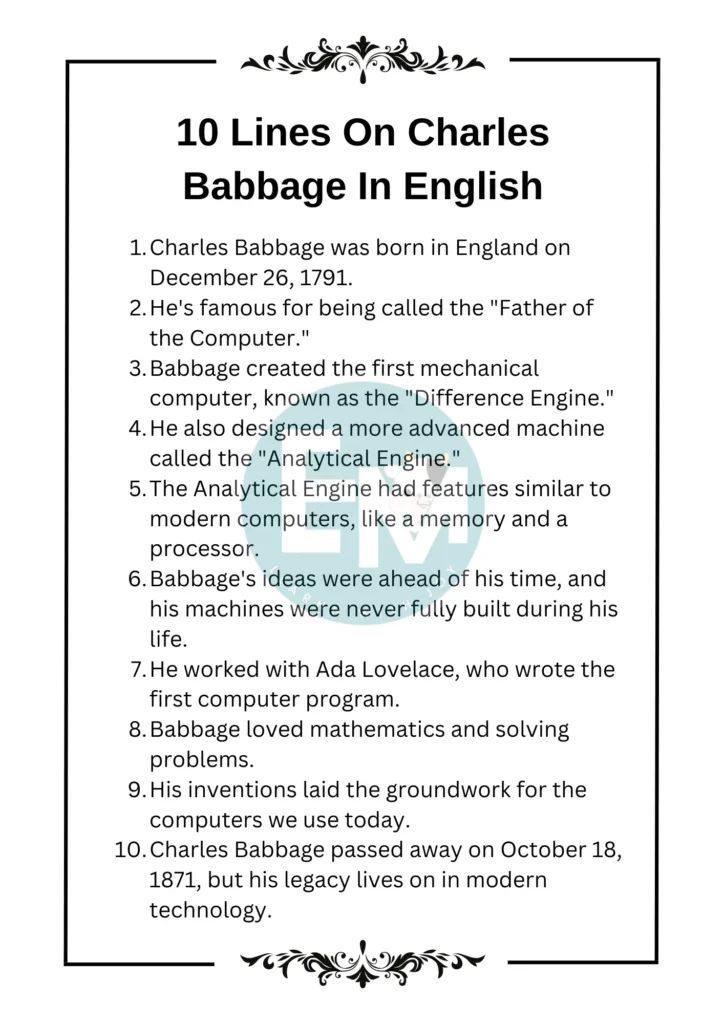In the world of computers, there’s a special person we should know about – Charles Babbage. He was a brilliant inventor who lived a long time ago but made a big impact on how we use computers today. Let’s learn about him in just 10 lines on Charles Babbage!
10 Lines On Charles Babbage In English
- Charles Babbage was born in England on December 26, 1791.
- He’s famous for being called the “Father of the Computer.”
- Babbage created the first mechanical computer, known as the “Difference Engine.”
- He also designed a more advanced machine called the “Analytical Engine.”
- The Analytical Engine had features similar to modern computers, like a memory and a processor.
- Babbage’s ideas were ahead of his time, and his machines were never fully built during his life.
- He worked with Ada Lovelace, who wrote the first computer program.
- Babbage loved mathematics and solving problems.
- His inventions laid the groundwork for the computers we use today.
- Charles Babbage passed away on October 18, 1871, but his legacy lives on in modern technology.

Essay On Charles Babbage In English In 300 Words
Charles Babbage was a very clever man who lived a long time ago. He was born in England in 1791. Charles Babbage is known as the Father of Computers because he invented some amazing machines that helped pave the way for the computers we use today.
One of Charles Babbage’s most famous inventions is called the Difference Engine. It was like a big calculator that could do math problems very quickly. Back then, people had to do math by hand, which took a long time. But with the Difference Engine, math became much easier and faster.
But Charles Babbage didn’t stop there. He had an even bigger idea. He wanted to create something called the Analytical Engine. This machine was like a super-smart computer. It could do all sorts of things, like store information and follow instructions to solve problems. The Analytical Engine was way ahead of its time. It had parts that were similar to the ones we find in modern computers today.
Even though Charles Babbage was really smart and had great ideas, he faced some challenges. Back in the 1800s, technology wasn’t as advanced as it is now. Building his machines was really difficult because the tools and materials weren’t available. So, unfortunately, Charles Babbage’s Analytical Engine was never completed during his lifetime.
But Charles Babbage’s legacy lives on. His ideas inspired many other inventors to keep working on computers and making them better. In fact, one of his friends, Ada Lovelace, wrote the first computer program for the Analytical Engine. She showed that computers could do more than just math – they could follow instructions to do all kinds of tasks.
Today, we owe a lot to Charles Babbage. Every time we use a computer, we’re benefiting from his brilliant ideas. Computers have changed our world in so many ways, from how we learn and work to how we communicate with each other. And it’s all thanks to Charles Babbage, the Father of Computers.
| Also Read: 10 Lines On Gir National Park In English |
Essay On Charles Babbage In English In Words
In the world of computers, there’s a special person we should know about – Charles Babbage. He was not just an ordinary person; he was a brilliant inventor who lived many years ago but made a big impact on how we use computers today. Let’s explore the life and contributions of Charles Babbage in this essay.
Charles Babbage was born on December 26, 1791, in England. He was a curious child who loved to explore and learn new things. His father was a banker, so he had access to books and education from a young age.
Charles attended school where he showed a great interest in mathematics, a subject he would later become famous for. He studied at Cambridge University, where he learned even more about math and science.
One of Charles Babbage’s most famous inventions is the Difference Engine. This was the world’s first mechanical computer. It was designed to perform mathematical calculations automatically. Imagine a big machine made of gears and levers that could add, subtract, multiply, and divide numbers without any human help!
Babbage came up with the idea for the Difference Engine when he realized that human errors often occurred when doing long and tedious calculations by hand. He wanted to create a machine that could do these calculations quickly and accurately.
But Charles Babbage didn’t stop there. He had an even bigger idea – the Analytical Engine. This was a revolutionary concept that laid the foundation for modern computers. The Analytical Engine was like a supercharged version of the Difference Engine. It could not only perform mathematical calculations but also store data and make decisions based on that data.
In other words, it was the world’s first programmable computer! Babbage’s design for the Analytical Engine included features like memory, processing units, and even a printer. Although the Analytical Engine was never fully built during Babbage’s lifetime due to technical and financial challenges, his ideas were way ahead of his time and paved the way for future innovations in computing.
Charles Babbage collaborated with Ada Lovelace, a mathematician and writer, on the Analytical Engine project. Ada Lovelace was fascinated by Babbage’s work and saw the potential for the Analytical Engine to do more than just mathematical calculations.
She wrote what is now considered to be the world’s first computer program for the Analytical Engine. Ada’s program showed that the Analytical Engine could be used to solve a variety of problems, not just mathematical ones. Her insights into the potential of computers helped to shape the future of computing.
Charles Babbage passed away on October 18, 1871, but his legacy lives on. His inventions and ideas have had a profound impact on the development of modern computers. Every time we use a computer or a smartphone, we owe a debt of gratitude to Charles Babbage. He was truly a visionary whose work continues to inspire and influence generations of scientists, engineers, and inventors.
In conclusion, Charles Babbage was a true genius whose contributions to the field of computing have changed the world. From the Difference Engine to the Analytical Engine, his inventions laid the foundation for modern computers. His collaboration with Ada Lovelace further expanded the possibilities of computing.
Although he faced many challenges during his lifetime, Charles Babbage never gave up on his vision of creating machines that could think and calculate like humans. Today, we can see the results of his hard work and dedication in the computers and technology that surround us. Charles Babbage will always be remembered as the Father of the Computer.
Conclusion
So, now you know about Charles Babbage (by exploring 10 lines on Charles Babbage), the Father of the Computer! Even though he lived many years ago, his ideas and inventions still influence our world today. Every time you use a computer or a phone, remember to thank Charles Babbage for his amazing contributions to technology!

